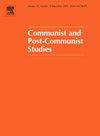历史重演
IF 1.3
4区 社会学
Q3 INTERNATIONAL RELATIONS
引用次数: 0
摘要
本文分析了前现代越南的中国性及其对越南过去和现在对中国和东南亚外交政策的影响。“中国性”一词指的是儒家思想和价值观在越南的实践和保存,这可能包括天命和儒家正统观念及其随后的正统血统问题。越南被认为在文化上比韩国和日本更接近中国,在历史上,越南一直依靠这些概念来定位自己的战略地位,并处理与-à-vis中国和其他东南亚小国的关系。越南法院过去常常质疑满族领导的清朝的合法性和正统血统,因为他们认为自己是汉人世界的一部分。对满族人的优越感和作为中华文明守护者的优越感在阮朝达到了高潮,这在一定程度上决定了越南当时对中国和其他东南亚国家的外交政策。此外,这种根深蒂固的中国性也有助于越南决策者了解当代中国,并微妙地指导越南今天外交政策的制定。本文章由计算机程序翻译,如有差异,请以英文原文为准。
History Repeating Itself
This article analyzes Chineseness in premodern Vietnam and its influence on Vietnam’s foreign policy toward China and Southeast Asia both past and present. The term Chineseness refers to the practice and preservation of Confucian ideas and values in Vietnam, which arguably consists of the Mandate of Heaven and Confucian Orthodoxy concepts and their subsequent orthodox lineage issue. Being considered culturally closer to China than Korea and Japan, Vietnam, throughout history, has relied on these concepts to position itself strategically and navigate its relations vis-à-vis China and other smaller countries in Southeast Asia. Vietnamese courts used to question the legitimacy and orthodox lineage of the Manchu-led Qing dynasty because they imagined themselves as part of the Sinic world. The sense of superiority over Manchus and of being the guardian of Sinic civilization reached a climax during the Nguyen dynasty, in part shaping Vietnam’s foreign policy toward China and other Southeast Asian countries at that time. In addition, this deep-seated Chineseness also helps Vietnam’s decision-makers to understand contemporary China, and subtly guides the creation of Vietnam’s foreign policy today.
求助全文
通过发布文献求助,成功后即可免费获取论文全文。
去求助
来源期刊

Communist and Post-Communist Studies
Multiple-
CiteScore
1.90
自引率
0.00%
发文量
23
期刊介绍:
Communist and Post-Communist Studies is an international journal covering all communist and post-communist states and communist movements, including both their domestic policies and their international relations. It is focused on the analysis of historical as well as current developments in the communist and post-communist world, including ideology, economy and society. It also aims to provide comparative foci on a given subject by inviting comments of a comparative character from scholars specializing in the same subject matter but in different countries.
 求助内容:
求助内容: 应助结果提醒方式:
应助结果提醒方式:


